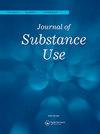工作记忆在年轻人酒精使用中的内隐联想调节作用
IF 0.6
4区 医学
Q4 SUBSTANCE ABUSE
引用次数: 0
摘要
摘要背景:在年轻人中,酒精的使用明显增加,这使得探索饮酒机制变得非常重要。根据双过程模型,内隐联想对酒精消费有显著影响。文献表明,工作记忆可以缓和内隐联想对酒精使用的影响,以及它对危险饮酒者的影响,但关于其他饮酒模式的研究对象的结论是矛盾的。目的本研究旨在评估工作记忆在低风险饮酒模式下内隐联想与饮酒及其后果之间的调节作用。方法选取年龄在18 ~ 25岁的青壮年65例。参与者回答了有关消费模式、酒精相关后果、隐性酒精身份关联和工作记忆的问题。结果发现了工作记忆的调节作用;在工作记忆较差的个体中,与酒精相关的内隐联想与酒精使用及其后果之间存在更强的联系。我们的研究结果强调了工作记忆在不同消费水平中的关键作用,使我们能够概述可能阻止更严重消费模式演变的努力。关键词:饮酒;年轻人;双过程模型;内隐联想;本工作由国家基金通过FCT - funda本文章由计算机程序翻译,如有差异,请以英文原文为准。
The role of working memory as a moderator of implicit associations in young adults’ alcohol use
ABSTRACTBackground Alcohol use is significantly accentuated in young adults, making it important to explore the mechanisms underlying consumption. According to the dual process model, implicit associations have a significant influence on alcohol consumption. Literature has been shown that working memory can moderate the effect of implicit associations on alcohol use and its consequences on hazardous drinkers but conclusions about subjects with other drinking patterns are contradictory.Objective This study aimed to assess the moderating role of working memory on the relationship between implicit associations and alcohol use and its consequences in a sample with a low-risk drinking pattern.Methods Sixty-five young adults aged between 18 and 25 years were included. Participants answered questions about measures of consumption pattern, alcohol-related consequences, implicit alcohol-identity associations and working memory.Results Evidence was found about the moderating role of working memory; in individuals with lower working memory there is a stronger link between alcohol-related implicit associations and alcohol use and its consequences.Conclusions Our findings highlight the crucial role of working memory across different levels of consumption, allowing us to outline efforts that may prevent the evolution to more severe consumption patterns.KEYWORDS: Alcohol consumptionyoung adultsdual-process modelimplicit associationsworking memory Disclosure statementNo potential conflict of interest was reported by the author(s).Additional informationFundingThis work was funded by national funds through FCT - Fundação para a Ciência e a Tecnologia - as part the project CIP - Refª UIDB/PSI/04345/2020.
求助全文
通过发布文献求助,成功后即可免费获取论文全文。
去求助
来源期刊

Journal of Substance Use
SUBSTANCE ABUSE-
CiteScore
1.60
自引率
0.00%
发文量
129
期刊介绍:
Journal of Substance Use is a bimonthly international journal, publishing peer-reviewed, up-to-the-minute articles on a wide spectrum of issues relating to the use of legal and illegal substances. The Journal aims to educate, inform, update and act as a forum for standard setting for health and social care professionals working with individuals and families with substance use problems. It also informs and supports those undertaking research in substance use, developing substance use services, and participating in, leading and developing education and training programmes.
 求助内容:
求助内容: 应助结果提醒方式:
应助结果提醒方式:


